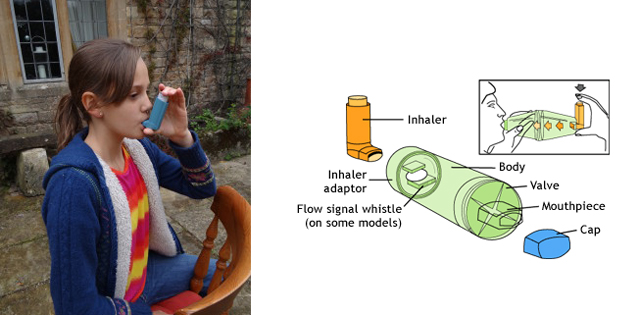What we all should know about Asthma
Health
What we all should know about Asthma
We have all probably heard the recent stories in the press highlighting the dangers of asthma, and unfortunately how the UK has one of the worst survival rates in Europe. So what can we do to help ourselves and our loved ones who may suffer from asthma?
The National Review on Asthma Deaths published 6th May 2014 has shocking statistics. The UK has one of the worst survival rates in Europe with an average of 3 people dying from asthma every day. Every 10 seconds someone has a potentially life threatening attack and yet Asthma is routinely viewed as a common and minor condition. Many people rely on their blue puffers far too often and are unaware that reliance on the reliever inhaler is a sign that their condition is not properly controlled. Blue inhalers should only be needed as a maximum 2 or 3 times a week and if required more frequently the sufferer should return to their GP or contact their asthma nurse to review their medication.
The report demonstrated that medical professionals often failed to manage asthma and initiate specialist referrals appropriately and highlights the fact that even mild asthmatics can have serious and life threatening asthmatic attacks. Asthma UK is working tirelessly to educate people about Asthma in order to reduce the mortality associated with this disease. Many of these deaths were preventable.
What is Asthma
Asthma is a common condition in which their airways go into spasm and cause tightness of the chest and severe difficulty breathing when someone is exposed to something that irritates their airways.
The airways become narrow and the lining of the airways become inflamed, start to swell and can also start producing sticky mucus or phlegm which makes it even harder to breath.
What causes asthma?
If there is a family history of asthma, eczema or allergies there is a higher incidence that someone could develop asthma. Research has also shown that smoking during pregnancy significantly increases the risk of a child developing asthma. Similarly, children whose parents smoke are more likely to develop asthma.
Asthma can be triggered by all sorts of things:
Exercise can trigger attacks in some children, however children should not avoid exercise because they are asthmatic – they should always have their reliever inhaler with them and are sometimes encouraged to take it prior to exercise. some children have specific allergic triggers which bring on a major asthma attack in response to their specific allergens. Asthma sufferers will learn what triggers their particular breathing problems.
Symptoms of asthma include; coughing, wheezing, shortness of breath and tightness in the chest. Often people find it particularly difficult to breathe out and have an increase in sticky mucus and phlegm. Not everyone will get all of these symptoms. Some people experience them from time to time; a few people may experience these symptoms all the time.
How to help in an asthma attack
Be calm and reassuring as reducing the stress and keeping the casualty calm really helps them to control their symptoms and panic can increase the severity of an attack.
Take one to two puffs of the reliever inhaler (usually blue), immediately - using a spacer device if available.
Sit them down, loosen any tight clothing and encourage them to take slow, steady breaths.
If they do not start to feel better, they should take more puffs of their reliever inhaler, or if they don't start to feel better after taking the inhaler or you are worried at any time, call 999/112.
They should keep taking the reliever inhaler whilst waiting for the paramedics to arrive.

Using a spacer device has been shown to deliver the medication much more effectively and increases the amount of the medication reaching the airways rather than hitting the back of the throat, this helps people to achieve much great control of their asthma.
There are a huge variety of shapes and sizes, but not all spacers fit all types of inhalers - use the spacer prescribed with the inhaler. Spacers for smaller children are usually fitted with a face mask. There is considerable co-ordination required to use an inhaler without a spacer and this can lead to increased stress and worsening of symptoms. Always keep the spacer with the inhaler and have both available at all times.
NOTE: Encouraging someone to sit upright may be helpful when dealing with breathing problems. Sitting the wrong way round on the chair may help. DO NOT take them outside for fresh air if it is cold - cold air can make symptoms worse.
After an emergency asthma attack
They should make an appointment with your doctor or asthma nurse for an asthma review, within 48 hours of their attack. People often have a variety of different asthma inhalers and medication to control their asthma - if they are having an asthma attack it is the reliever inhaler that they need. Reliever inhalers are usually blue. It is strongly advised that you attend a Practical First Aid course to understand what to do in a medical emergency.
Please visit www.firstaidforlife.org.uk or email emma@firstaidforlife.org.uk or call 020 8675 4036 for more information about all First Aid for Life courses. First Aid for life provides this information for guidance and it is not in any way a substitute for medical advice. First Aid for Life is not responsible or liable for any diagnosis made, or actions taken based on this information.
Asthma UK has a great programme to help children with asthma and their parents and carers to manage their asthma and live a full and active life. For more information visit www.asthma.org.uk
Related Articles
Dragons launches new nursery fabrics
First Aid training - Why knowing what to do is so important
Preventing and treating poisining with First Aid For Life
Crash Course in A & E Paediatric First Aid for Parents
Firework Advice and First Aid tips should something go wrong
A bright Montessori future in Brooke Green
Helmets - can they really save lives?
Why first aid skills are important for older children and teenagers
Vital first aid tips for Fireworks
What to do when a child is choking
Halloween and Bonfire Night First Aid Tips
Related Products
Have Your Say
Be the first person to comment on this article, just post a comment below.





In order to post a comment you need to be a member. Join Now | Sign in